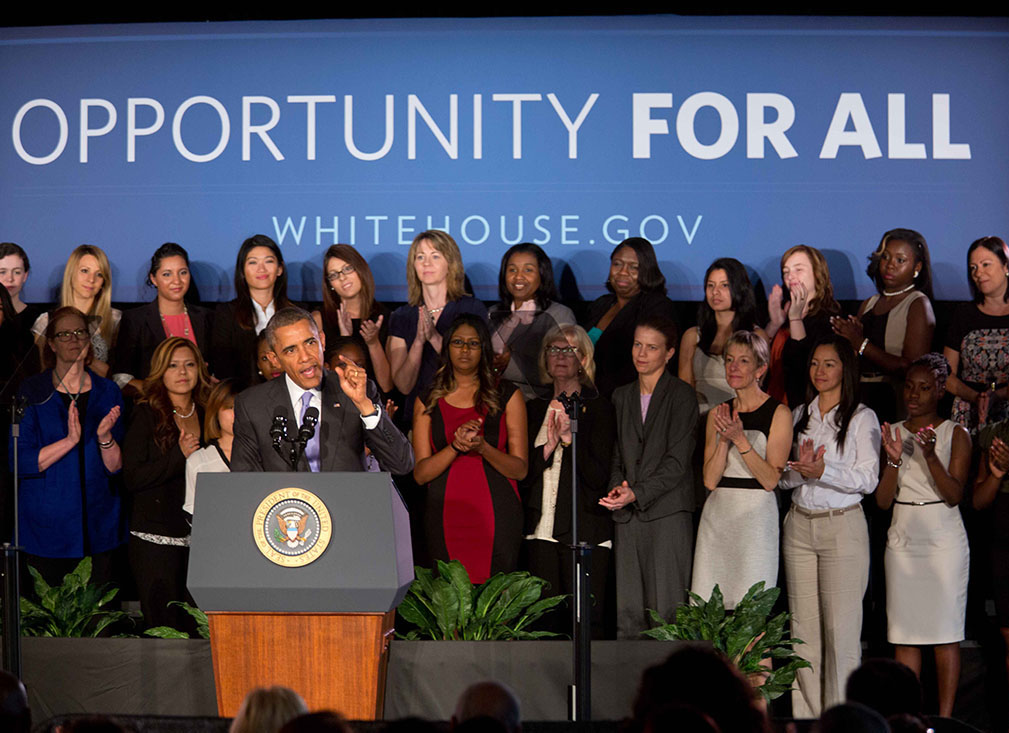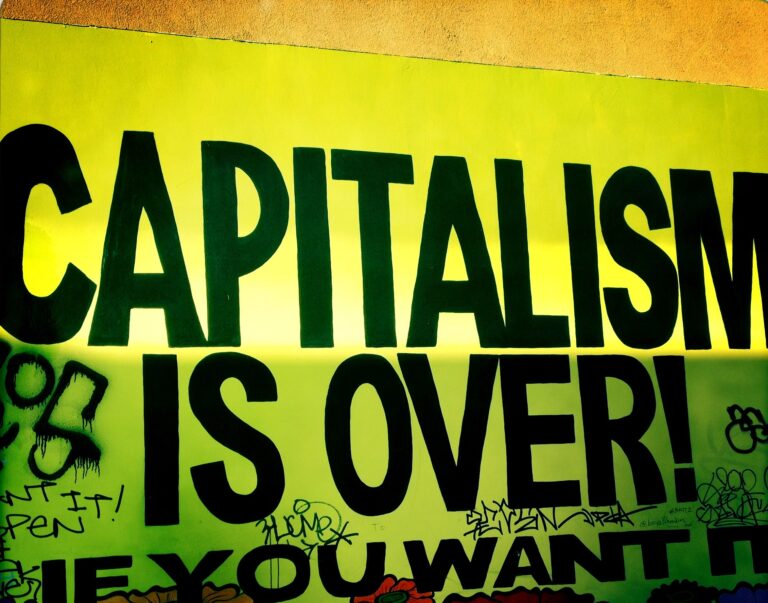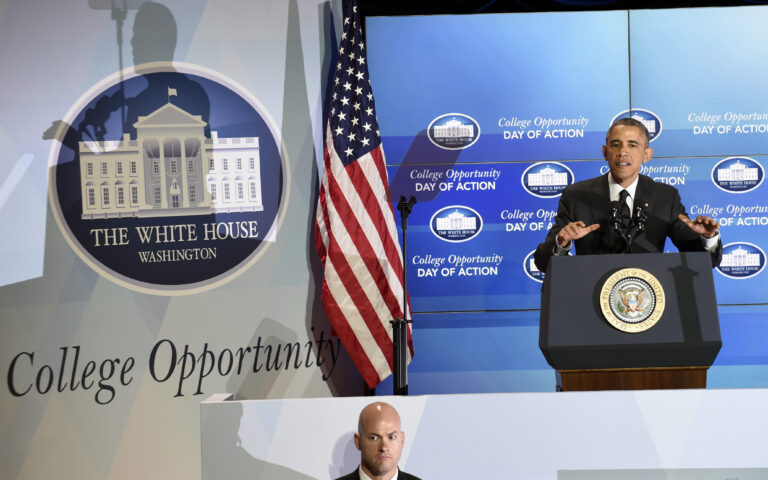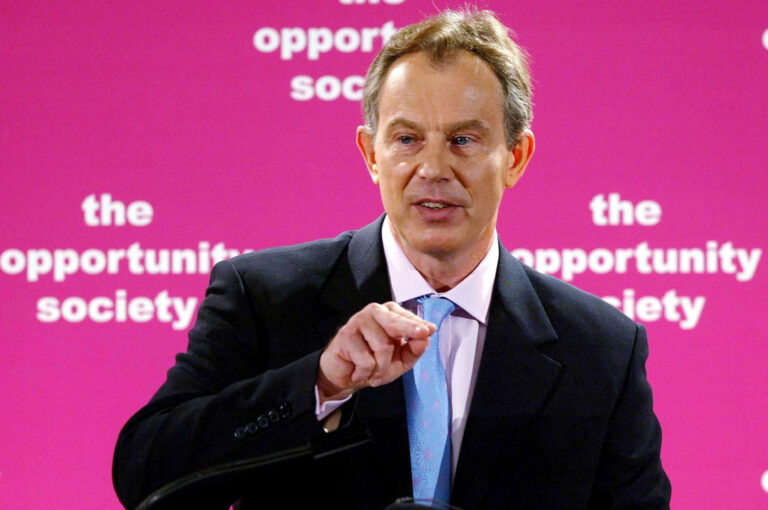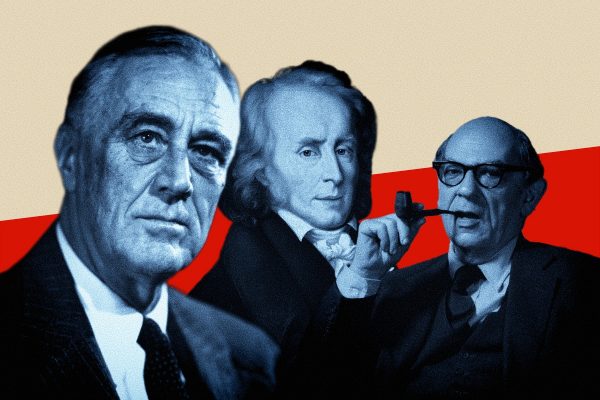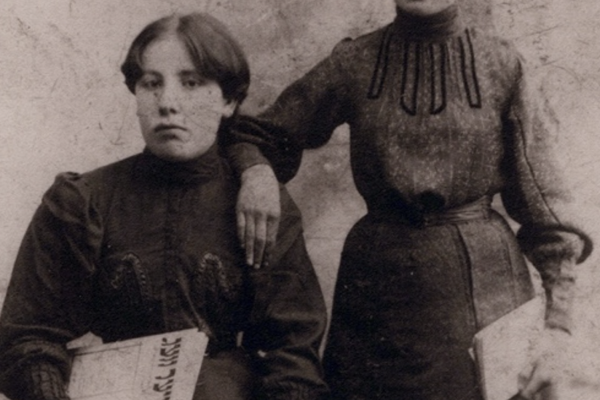This forum appears in print in Is Equal Opportunity Enough?.
The last decade has delivered increasingly bleak portraits of vast inequalities in income, wealth, health, and other measures of well-being in many rich capitalist countries, from the United States to the United Kingdom. What should we do about them?
One common response is to argue that inequalities are only a problem to the extent that they reflect unequal opportunities. Economist Jared Bernstein—a longtime advisor to Joe Biden, and now a member of Biden’s White House Council of Economic Advisers—expressed this view clearly in 2014 when he stated, “Opportunity and mobility are the right things to be talking about. . . . We always have inequality, and in America we’re not that upset about inequality of outcomes. But we are upset about inequality of opportunity.” Accordingly, in his first executive order as president, Biden proclaimed that “equal opportunity is the bedrock of American democracy.” For his part, British Labour leader Keir Starmer has stated his party’s aim should be to “pull down obstacles that limit opportunities and talent.” And Prime Minister Justin Trudeau has intoned that in Canada, where I live, “no matter who you are . . . you have every opportunity to live your life to its fullest potential.”
These statements are typical. In much of the West the tendency is to see equality as a matter of fairly distributed opportunities and to view an interest in outcomes as unreasonable, naïve, or even authoritarian. A similar focus on equality of opportunity is evident in the dominant strain of political philosophy in the Anglo-American world, liberal egalitarianism. In short, the prevailing political common sense tends to converge on the assumption that our egalitarian aspirations are realized once we have ensured equality of opportunity.
I think this view is seriously mistaken. Opportunity talk—and a host of ideas associated with it, including flawed conceptions of freedom, choice, and personal responsibility—plays far too central a role in our discussions of equality, poorly serving the egalitarian ideal and leaving a lot of inequality untouched. An egalitarian society should not shy away from a concern with outcomes, I will argue. Its goal must be that people live equally flourishing lives, not merely that they have the opportunity to do so.
The concept of flourishing, prominent in the socialist tradition, directs us to a more generous, substantive, and far-reaching egalitarianism. We care about inequality, this perspective stresses, because of its effects on people—not, or not only, because it violates an abstract principle of justice—and we lose interest in problems of inequality if the putatively unequal are doing equally well in their quality of life. Amartya Sen asked the classic question “equality of what?”—what is it, exactly, that egalitarians seek to equalize? The answer is flourishing, since whatever policies or principles we adopt, it is flourishing that we hope will be made more equal as a result of our endeavors.
At a moment of broad awareness of grave inequalities in our societies and eagerness to do something about them, it is essential to recognize that equality requires a focus on outcomes, not mere opportunities.
The idea of equality of opportunity has played an important though complex role in progressive thought. As British historian Ben Jackson has noted, the notion “has a consensual and uncontroversial connotation” yet it is also “an exceptionally malleable concept, susceptible to an extraordinary range of interpretations.” The radical left has often harbored an antipathy to the idea, viewing it as empty rhetoric in the face of persisting class inequality. Liberalism, by contrast, has long been dominated by a focus on equality of opportunity, though its meaning has evolved over time.
On one interpretation, the idea simply means that social barriers—racism or sexism, for example—should be eliminated in the competition for scarce and desirable positions. This is the meaning of equal opportunity instantiated in charters of rights that outlaw discrimination by the state and in a range of human rights policies that prohibit discrimination on the part of employers, landlords, and colleagues. From this perspective, the paradigmatic expression of equality of opportunity is something like the U.S. Civil Rights Act of 1964. Hence the well-known American expression “we are an equal opportunity employer.”
As many have argued, however, opportunity has not truly been equalized simply because discrimination is outlawed at the point of housing or employment. Thus British socialist R. H. Tawney wrote in Equality (1931) that what is needed is not just “an open road” but also “an equal start.” U.S. President Lyndon Johnson made a similar point at his 1965 commencement address at Howard University. “You do not take a person who, for years, has been hobbled by chains and liberate him, bring him up to the starting line of a race and then say, ‘you are free to compete with all the others,’ and still justly believe that you have been completely fair,” he said. “It is not enough just to open the gates of opportunity. All our citizens must have the ability to walk through those gates.” A year later, reflecting on the passage of major civil rights bills, Martin Luther King, Jr., called this next stage of struggle the “last steep ascent” of the civil rights movement. “The prohibition of barbaric behavior,” he wrote, “while beneficial to the victim, does not constitute the attainment of equality.”
These objections center on the idea that equal opportunity demands much more than the outlawing of discrimination and equal treatment before the law. It also requires far-reaching social and economic policy to transform unequal education and employment, which shape opportunity over the course of one’s life.
The liberal egalitarian political philosophy that has prevailed in the West since the 1970s has taken this point seriously, as evidenced in ideas like John Rawls’s notion of fair equality of opportunity, Ronald Dworkin’s framework of equality of resources, and Sen’s and Martha Nussbaum’s theory of equal capabilities. Rawls, for example, contends that to ensure that talent is the only criterion for public offices and social positions, everyone should have a “fair chance.” Achieving fair equality of opportunity, he argues, requires the elimination, or at least mitigation, of a host of barriers, including relations of domination, the influences of family income, and the impact of one’s social class. Likewise, Dworkin’s liberal egalitarianism models equality of opportunity on an insurance system for mitigating the effects of unjust inequalities.
These more substantial interpretations of equal opportunity have proven very influential. But it is noteworthy that they are quite compatible with significant inequality: just as the ordinary connotation of “opportunity” might suggest, some will fare better than others. Indeed, liberal egalitarians do not even aim for equality per se. Rawls accepts some inequalities so long as they benefit the worst off: this is the point of his “difference principle.” Similarly, Dworkin takes for granted that there will be inequalities in a fully realized system of equality of opportunity.
Liberals contend that a focus on opportunity, rather than what opportunity achieves, has a host of advantages.
First, it is defended in terms of freedom. A focus on opportunity, the argument goes, respects individual freedom in making life choices. This follows from the principle of “neutrality” endorsed by Rawls and Dworkin, according to which the political community should not weigh in on what counts as a good life. There are rival views about how to live, and the state should not choose among them. As Jonathan Quong puts it, the neutral state is concerned not to treat citizens “as if they lack the ability to make effective choices about their own lives.”
Second, a focus on opportunity is defended in terms of equality. Dworkin, for example, contends that an egalitarian principle justifies the mechanisms of the market. As Dworkin sees it, market exchange ensures that each person—their preferences and choices—counts for as much as any other, and the state is not able to betray any bias in favor of some plans of life over others. “A liberal theory of equality rules out . . . appeal to the inherent value of one theory of what is good in life,” he writes. With its agnosticism about the good, the focus on opportunity is said to treat people with equal concern and respect.
Third, for many egalitarians, equality of opportunity means people can be held responsible for their choices. The state ensures that opportunities are equally available, and it’s then up to individuals to take them up and live with the consequences.
Finally, equality of opportunity means that a truly meritocratic hierarchy can be achieved. This is valuable on grounds of fairness, the argument goes, since jobs, positions, and goods will go only to those who are qualified; it is also instrumentally valuable since society benefits from the best candidates being appointed to their relevant tasks. It is for this reason that Richard Arneson has characterized equal opportunity as “a political ideal that is opposed to caste hierarchy but not to hierarchy per se” because “the background assumption is that a society contains a hierarchy of more and less desirable, superior and inferior positions” that map on to people’s capacities. This is made explicit in the egalitarian meritocracy of David Miller, for example, who defends the meritocratic ideal whereby “each person’s chance to acquire positions of advantage and the rewards that go with them will depend entirely on his or her talent and effort.”
Most liberal egalitarians are uneasy with inequality due to differences in talent, however, proposing that we distinguish between choice and circumstance. Dworkin offers a corrective to Rawls with the idea that a theory of justice should attend not to all inequalities, but only those due to a person’s circumstances, be it their limited talents, tough family background, or the disadvantages that come with unanticipated bad luck. Inequalities due to “option luck”—that is, due to people’s choices—are not owed compensation. People are responsible for their ambitions and tastes: it is down to them if they choose to gamble or squander their resources. If we respect the freedom to choose how to live, Dworkin contends, responsibility must be assigned to the individual for the mistakes she freely makes. On this view, a community may offer humanitarian assistance to those whose disadvantages are their own responsibility, but justice does not demand it.
With this focus on responsibility, what has been dubbed “luck egalitarianism” became a prominent and influential position among egalitarians. Luck egalitarians’ hard line on responsibility suggests a sink-or-swim aspect inimical to the “to each according to his need” ideal of the socialist tradition. It may thus come as a surprise that luck egalitarianism garnered the endorsement of political philosophers on the left such as John Roemer and G. A. Cohen, who, earlier in their careers, were self-described “analytical Marxists.” Roemer elaborated his own version of equality of opportunity that took account of the propensity of disadvantaged social groups to make poor choices, making the case that brute luck played a significant role as a cause of inequality. Nonetheless, the idea of responsibility reigned, and Cohen went so far as to salute Dworkin for performing for egalitarianism “the considerable service of incorporating within it the most powerful idea in the arsenal of the anti-egalitarian right: the idea of choice and responsibility.”
On the luck egalitarian view, a hierarchy of rewards may persist under equality of opportunity, just so long as that hierarchy is not due to the social barriers of prejudice or family background, or even diversity of talent. On this “level playing field,” inequality persists only because of individuals’ decisions. Because it seeks to “correct for all unchosen disadvantages,” Cohen contends, the luck egalitarian position can even be called “socialist” equality of opportunity. Shlomi Segall has made a more recent case for the relevance of outcomes, proposing a “non-responsibility” amendment to luck egalitarianism, which says that equal outcomes, however they emerge, are not unjust. Nonetheless, he defends the view that unequal outcomes are just if someone is worse off because it is “their fault.” Even Elizabeth Anderson, one of luck egalitarianism’s harshest critics, warns that a satisfactory alternative “heads off the thought that in an egalitarian society everyone somehow could have a right to receive goods without anyone having an obligation to produce them.”
This prevailing emphasis on responsibility has proven to be very influential. Sen and Nussbaum reject liberals’ narrow focus on economic goods, arguing that the impact of goods on capabilities is what matters—capabilities to be well-nourished, sheltered, or educated. But they too have tailored their view to take account of choice and responsibility. Capability theory takes quality of life—“what goods do” for people—as the appropriate egalitarian metric, but in practice, “respect for persons,” as Nussbaum puts it, means deploying an opportunity-like measure: capability to function, not functioning per se.
Various attempts have been made to save the opportunity approach from the potential for harsh outcomes—for example, through social insurance schemes to protect people from the consequences of their bad choices. But they retain a laissez-faire aspect and fail to reckon seriously with how some people might fare quite badly. Opportunities are assured by a distribution of the means to whatever ends people seek to pursue, subject to their own responsibility for their choices, but after that, the political community steps back. In effect, the opportunity focus, in all its variants, washes its hands of how people are actually faring once it is determined that disparities in distributive outcomes are simply the result of people, as Arneson puts it, electing to “use and abuse” their equal opportunities. There may be humanitarian redress for disastrous outcomes in such cases, but egalitarian justice does not apply.
There are at least three reasons we should reject this focus on opportunity in egalitarian thought. Consider them in turn.
Choice as circumstance
It is difficult to draw a sharp line between what one chooses—in the sense of what one can be said to be responsible for—and what is the result of factors beyond a person’s control. The question of responsibility enters murky waters of free will, determinism, and commonsense sociology about class divisions and social capital. But at least this much can be said: it is one thing to freely choose to do something, and it is another to be held responsible for the consequences, particularly if unjust social conditions incline us freely to choose badly. It is not just that the circumstance-choice distinction is hard to draw, especially since bad choices may result from economic disadvantage rather than the other way around. It also seems harsh to condemn the imprudent to impoverishment, particularly if their decisions are shaped by, and in turn reinforce, a class-divided society with lasting intergenerational effects.
The crude “talent plus effort” model of human endeavors thus looks like an unreasonable portrayal of how a human life goes, whatever weight one gives to either factor in the equation. Personhood is a dynamic process in which nurture and nature, circumstance and choice, are mutually constitutive. Individuals figuring out how to live—the appropriate next steps to take, what opportunities to avail themselves of—are mired in unjust social conditions that cannot be stripped away in order to isolate choice per se. Inequality has a devastating effect on people’s ability to determine the course of their lives. When people are in hopeless situations, in precarious work or chronically unemployed, in destructive relationships, suffering poor mental health, or living in dismal conditions, the odds of bettering one’s lot look bleak.
Nicholas Vrousalis says:
“Equal flourishing is not part of the socialist ideal of equal freedom.”
Moreover, as Joseph Fishkin and Clare Chambers have noted, one choice can generate outcomes that themselves are not chosen and that further shape opportunities. For some, the path of life is largely how one door opens yet another. For others, all doors are closed, or, having closed one door, subsequent doors are not only closed to them but not even discernible; some doors immediately lock behind them; and some lead into rooms with no other exit.
In order to avoid a harsh approach to the consequences of choice, progressive luck egalitarians acknowledge that some disadvantages can result from choices so undermined by social factors beyond a person’s control that they should be relegated to the domain of unchosen circumstances. In other words, instances of clear-cut, choice-induced lack of flourishing may be few and far between. After all, one cannot assume that imprudent persons are not contributing as best as they can—that is, as Marx put it, according to their ability, or as Cohen says, “appropriately” to their “capacity.”
But if we go this route, ideas of luck seem beside the point, at best of mere polemical value in warding off right-wing challenges to the principle of redistribution. We put the cart before the horse if we attribute “bad luck” to outcomes we think of as unjust when encountering challenges deploying luck as a criterion for justice. As many critics have pointed out, from Anderson to Samuel Scheffler and Jonathan Wolff, better just to dispose of the unhelpful apparatus of luck egalitarianism altogether.
The greatest obstacle to embracing this conclusion may be the concern that doing so entails thinking of individuals as unable to control the direction of their lives. But this idea relies on a false understanding of the nature of agency, where individuals are freely choosing only if they are untouched by social influences. In truth, our desires, tastes, even needs, are shaped within a social context, molded by a myriad of influences. Liberals say that one’s life goes better if led from “the inside,” according to one’s plans and goals. Certainly, a life cannot be lived any other way but from the “inside,” but who one is “on the inside” is affected by her situation on the outside, the influence of a social milieu—including the damaging effects of social class and other ills endemic to capitalist societies.
In short, choices are never made in a vacuum: the tastes of friends, the values of parents and those with authority or influence, formative experiences in one’s life, and superficial factors such as the symbolic value of a pursuit all contribute to what seems to us to be our choices about how to live. We must, as David Bakhurst puts it, “wean ourselves off the idea that the self is something purely inner and psychological.” The personal is social and political—deeply shaped by “outer” factors, too.
Ignoring this does not spare us from social influence; it just defers to a certain kind of social influence— not just that of social class and other inequalities, but also, in particular, the influence of the market. Markets are often touted for conducting exchange according to the supposedly neutral measure of profitability, but market forces have significant consequences for the kinds of values one can pursue. The effects are often deleterious for human flourishing, even measured by people’s expressions of satisfaction. And of course, market actors who influence our choices are not typically held to public account or democratic control.
If the individual is embedded in a complex weave of social factors, it is poor sociology to deem the ideal society as one where individuals enjoy absolute authority over judgments of value. And poor sociology makes for poor ethics, since refusing to exert political influence on the social environment leaves it open to all kinds of other influences, less worthy in their goals, and less transparent and democratic in their methods. The contrast should not be between individuals free to choose under a regime of neutrality as opposed to individuals rendered unfree by a focus on outcomes. Rather, what’s at issue is how individuals’ choices are constrained by an unaccountable market as opposed to individuals whose social environment is regulated by representative political institutions that facilitate good choices.
If by coercion we mean society rendering some choices more attractive than others, then a focus on flourishing is guilty as charged—but then so is just about any polity. Liberal societies today encourage some ways of life and discourage others: take state support for education and the arts, for example, and the lack of state support for, or discouragement of, harmful activities such as smoking. Indeed it is difficult to imagine any society not taking an interest in values and not justifying its policies by reference to them. The more pressing question is what methods a polity should deploy to enable citizens to live well. Out and out coercion, including punishment or threats to punish, should be inadmissible, but given that influence is inevitable, the responsible course is to embrace influence and to use it carefully, publicly, and transparently, guiding by incentives, education, and supporting institutions that offer pursuits of value.
Doing in order to be able to do
A second reason to reject opportunity talk is that it too easily concludes, in the face of unequal flourishing, that everyone has an equal opportunity to live a good life. It is difficult to truly attend to hindrances to flourishing simply by making choices available. If people fail to take up an opportunity and end up living unflourishing lives, the egalitarian attitude cannot be simply to acquiesce—to rationalize that the community did what it could, but people for their own reasons did not avail themselves of opportunities to flourish.
Rather, the egalitarian community will want to be proactive: to equip people to take opportunities through incentives and other social institutions, and thereby to encourage people to see the value of one choice over another, to appreciate why an opportunity is worthwhile. This may mean we need to introduce young people to pursuits that they are not inclined to take up, so that they are more likely to choose them. This does not mean forcing people to do anything, but it does mean taking unequal outcomes as a form of unjust inequality and seeking to intervene to enable people to make the most of their potential.
Often we need to do things in order to be able to do them. As Nussbaum notes, there are cases when “the absence of a function is really a sign that the capability itself has been surrendered.” To ensure that opportunities will indeed be taken, we must engage in a substantive discussion about the value of various enterprises and eschew mere “cultural marketplace” conceptions of how people acquaint themselves with valuable options.
Now, this can all be turned into opportunity talk: that what is at issue is simply giving people genuine opportunities to flourish. But the flourishing view commits us to rather more effort than is historically associated with views that emphasize mere opportunity. And the enterprise is inherently outcome-oriented, insofar as it refuses to take people’s choices—whether explicit or revealed—at face value and regards unequal outcomes as signaling the need for remedy. This means rejecting the neutralist paradigm in order to promote what is genuinely of value, to correct cultures of fatalism, low expectations, self-abnegation, or limited horizons. We should not be squeamish about an outcomes approach that takes a stand on how people should live.
Music is a good example of the kind of pursuit that may not be grasped as valuable or pursued over the course of one’s life without some initiation into it in the first place. Even if we remove social barriers and equalize material resources, people will be differently situated and shaped by different social environments, which may disincline them to take up the opportunity to explore the arts. Ensuring universal access to music lessons, for example, is arguably not good enough. For flourishing to be equal, we need to develop incentives and social institutions that promote the valuable, and compulsory arts and music education, of the right kind, is arguably among them. Indeed, there is a sense in which mandatory education in pursuits not readily chosen can increase not just equality in flourishing but also our freedom—widening the choices available to a person, but also, as Charles Taylor has argued, ensuring that “what you want does not run against the grain of your basic purposes, or your self-realization.”
Of course, in seeking to achieve equality of flourishing, we should take into account the plurality of ways of living well. Liberal egalitarians criticize outcome-focused views for weighing in on the meaning of “the good,” with the implication that what counts as living well is narrowly understood. But an outcome-focused approach does not assume there are only a very small number of ways to live well, nor does it require that flourishing, in some form or another, be imposed by force. Flourishing comes in many forms, and judging that one form of life falls short, or does not warrant social support, need not unjustly restrict our freedom. The focus should be on identifying and supporting a range of paths to flourishing, even as we rule out promoting, or even opt to disincentivize, other forms of life.
These considerations also mean that the egalitarian society should seek to enable people to choose well, to become better choosers, to take responsibility. Contribution should not be a condition for the remedy of disadvantage, as on the luck egalitarian view. Rather, one’s life goes better if one is contributing to the community, understood as broadly as possible, and not just in a narrow, productivist way. The flourishing picture understands failure to contribute as a source of disadvantage. Well-being involves taking an active part our communities if we are to live the life of “all-round development” extolled by Marx.
Nevertheless, we must be prepared to recognize persisting disparities in outcomes, not to acquiesce in them, but to propel us to revisit our policies—first, to ensure that they are truly the results of a diversity of valuable conceptions of how to live, and second, to open up the possibility that the options our society purports to make available, promote, and support, adequately capture what members of the community are properly interested in pursuing. After all, an egalitarian community must be prepared to revise what counts as valuable.
It is because flourishing matters that our egalitarian approach should allow for an element of maximization too. We cannot fall prey to the syndrome of leveling down, where we remove any additional measure of flourishing if it cannot be enjoyed equally by all. No amount of egalitarian social policy can fully negate the differences in disposition, health, or ability; after all, some of us cannot help but take a glum view on life. Nonetheless, we should be attentive to how inequality of outcome is the result of factors within our control. It is equal flourishing that matters, and we should not be hamstrung by a prohibition on seeking equality in how people actually live because of diversity about what counts as a good life.
Solidarity and outcomes
A third reason to reject opportunity talk is its sidelining of community. Despite all the discussion of responsibility among egalitarians, relatively little has been said about the responsibility members of an egalitarian society may have to their fellows, to enable them to be their equals. Marx, after all, despite his critique of capitalist exploitation as a “theft” of the worker’s rightful product, ended up severing contribution from distribution in his communist principles. The principle of “from each according to his ability, to each according to his needs” connects the contributions and allocations of community members in a profound way. This is because in the egalitarian community the flourishing of others matters.
A focus on opportunity undermines egalitarian community with its excessive attention to individual choices and rewards in isolation from social connection. The ideal of solidarity and comradeship that has long been inherent in the egalitarian ideal means that members of a community care, or will come to care, about the flourishing of others. The community that radical egalitarianism presupposes requires that all see themselves as full participants with duties of mutual aid, or what Pablo Gilabert calls “solidaristic empowerment”—something that Cohen, for all his luck egalitarian inclinations, also underscored in his discussion of socialism and the idea of an “egalitarian ethos.” Those who do well, be it a matter of effort or luck, are committed to sharing their benefits with others. Indeed, the lack of attention to the responsibilities of the lucky rich is a surprising feature of opportunity talk.
We are social beings insofar as our values are shaped by social circumstances, our well-being affected by our relationships, and our capacity to flourish in need of society’s guidance and support. Dworkin makes the insightful point that inequality insults and diminishes the self-respect of citizens, the rich as well as the poor, but he does not say much about how that truth should shape the relationships of members of an egalitarian community. On the flourishing approach, our own flourishing is enhanced insofar as others are flourishing too. Socialist community involves relationships of trust, generosity, and fellow feeling, at odds with the grudging attitude suggested by luck egalitarians.
Indeed, the justice of much contemporary egalitarianism seems, as Wolff puts it, “soulless,” sacrificing the relationships of solidarity that are usually thought to attend equality. The original egalitarian ideal of thinkers like Tawney involved harmonious relations where “to divide is not to take away,” transcending “details of the counting house,” not a society where, as Scheffler puts it, people make “heavily moralized judgments” about others’ contributions. It seems a sad comment that arguments for equality today hearken less to Marx’s communist ideal of a society where all have the means of life regardless of their contributions and more to Stalin’s dictum that “those who do not work do not eat.”
In short, the egalitarian community is committed to ensuring that people actually enjoy flourishing lives, and this is a social project. Liberal egalitarianism falls short as a truly egalitarian theory because its preoccupation with opportunity and freedom of choice leads it to forsake the relations of community at the heart of the equality ideal.
Stressing community has another important consequence: it can address non-material shortfalls in flourishing. This is not to suggest that material resources are not important for flourishing. Indeed, we should be skeptical of rival strands in egalitarianism that suggest that mutual respect or cultural recognition takes priority over, or can be separated from, people’s material situation. On the contrary, shortfalls in respect or recognition are often, perhaps inevitably, deeply intertwined with material inequalities; facilitating equal respect, status, and power requires that we attend to unequal material resources.
But the truth is that flourishing has both material and non-material aspects. This was recognized by the Victorian thinker William Morris, whose aesthetic views prompted him to become a socialist, and who railed against how capitalism meant people’s environments get “plainer, grimmer and barer” and how a “decent life” would involve “a beautiful world to live in,” which he took to be an elaboration of Marx’s egalitarian views.
People can also fail to flourish because they lack friendship or love—again, not always a matter of someone’s material situation, and a problem we should expect to persist even if material conditions were equalized. Alienation and loneliness should be objects of egalitarian concern, but equality of opportunity puts them outside the scope of egalitarian justice. At a time when mental health is deteriorating around the globe, it is all the more urgent that our social policies devise ways to make people equal in well-being in a rich, substantive sense that enables rewarding relationships with others.
An emphasis on mere opportunity, preoccupied as it is with individuals making choices apart from the community in order to acquire the material means to unspecified ends, lacks the resources to challenge these significant sources of inequality. A focus on outcomes enables us to consider how people can be unequal in multifarious ways—often connected to their material situation, but sometimes not.
Taken together, these considerations should undermine the preoccupation with opportunity in egalitarian thought. What is at stake in the pursuit of equality is human flourishing, and equal opportunities are insufficient insofar as they do not deliver equality in how people actually live.
What about the four benefits liberals attribute to a focus on opportunity? I hope to have shown either that these benefits are questionable or that an outcome approach can also, indeed better, provide them. First, a flourishing approach still respects individuals’ freedom to choose insofar as it embraces a diversity of valuable options and pursuits. Second, it better serves equality by eschewing neutrality and acknowledging that different plans of life are in fact not equal and can produce radically unequal outcomes. Third, a flourishing life involves making valuable contributions to the community, so an outcome approach seeks to inculcate the virtues of responsibility. And finally, once we go further to inculcate support for valuable pursuits, the outcome approach nurtures people’s talents more effectively, from which society might benefit.
These arguments are only the starting point for a political program focused on flourishing. Many questions remain. Guaranteeing equality of outcome is of course impossible; even the most benign human diversity will see to that. All the more reason that thought be given to what kinds of policies would advance equality in how people actually live, rather than what would simply expand opportunities. We also should consider how to facilitate legitimate, democratic debate about what counts as flourishing. In all this, however, it is essential to recognize that equality of opportunity is insufficient and that equal outcomes are in fact what we really care about.
Political philosophy’s preoccupation with neutrality and personal responsibility have hampered a serious engagement with the pursuit of equality. Liberal egalitarianism has shed light on the injustice of economic and social disparities, but we need to be reminded of the truly radical implications of the egalitarian ideal. The realization of that ideal requires not just opportunities to flourish but actual flourishing, understood in all its manifold dimensions, from the material to the cultural and social. In short, the egalitarian ideal requires socialism.
We’re interested in what you think. Submit a letter to the editors at letters@bostonreview.net. Boston Review is nonprofit, paywall-free, and reader-funded. To support work like this, please donate here.
